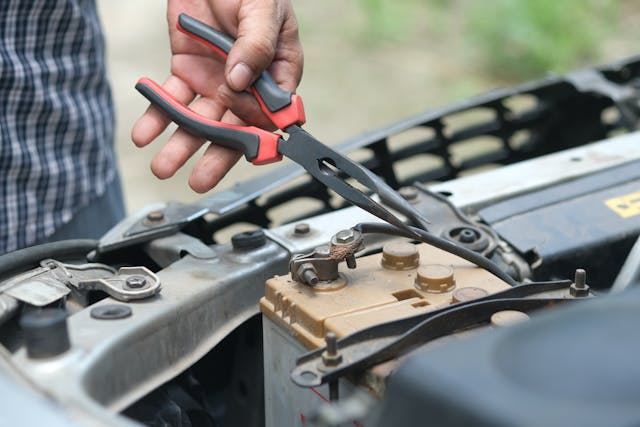
- Regular vehicle maintenance is crucial for safety, efficiency, and longevity on the road.
- Checking fluid levels like engine oil and coolant ensures optimal engine performance.
- Maintaining proper tire health, including pressure and tread depth, enhances vehicle handling.
- A well-maintained braking system, including brake pads and fluid, ensures safe stopping.
- Monitoring battery health and replacing filters as needed contribute to overall vehicle reliability.
Regular vehicle maintenance is essential to keep your car running safely and smoothly on the road. From routine checks to more comprehensive services, staying on top of maintenance tasks can save you money in the long run and prevent unexpected breakdowns. This article will explore five key things to consider during your regular vehicle maintenance routine to ensure your car stays in optimal condition for years to come.
1. Fluid Levels
Maintaining proper fluid levels is essential for the overall health of your vehicle. Here are two critical fluids to check regularly:
Engine Oil
Engine oil lubricates the moving parts of your engine, preventing wear and tear and ensuring optimal performance. Check your oil level regularly using the dipstick, and top it up if necessary. Additionally, pay attention to the oil color and consistency; if it appears dark or gritty, it may be time for an oil change.
Coolant
Coolant, also known as antifreeze, helps regulate your engine’s temperature and prevent it from overheating or freezing. Check the coolant level in the overflow reservoir and ensure it’s between the minimum and maximum marks. If the level is low, add a mixture of coolant and water as recommended by your vehicle manufacturer.
2. Tire Health

Your tires are the only point of contact between your car and the road, making their maintenance critical for safety and performance. Consider the following:
Tire Pressure
Proper tire pressure ensures optimal fuel efficiency, tire longevity, and vehicle handling. Use a tire pressure gauge to check the pressure monthly and adjust it according to the manufacturer’s recommendations. Remember to include the spare tire in your checks.
Tread Depth
Tire tread provides grip and traction on the road, especially in slippery and wet conditions. Use a tread depth gauge to measure the depth of the grooves; if they are worn beyond the recommended depth, it’s time to replace your tires.
3. Braking System
Your braking system is vital for your safety on the road, so it’s essential to keep it in top condition. Here’s what to consider:
Brake Pads
Brake pads wear down over time due to friction, so it’s crucial to inspect them regularly for signs of wear. If you notice squeaking or grinding noises when braking or if your brake pedal feels spongy, it may be time to get new brakes.
Brake Fluid
Brake fluid transfers the force from your foot on the brake pedal to the brake components, so maintaining the correct fluid level and condition is essential for proper braking performance. Check the brake fluid level regularly and ensure it’s within the recommended range. If the fluid is dark or cloudy, it may indicate contamination and require flushing and replacement.
4. Battery Health

Your car’s battery provides the electrical energy needed to start the engine and power various systems. To ensure reliable performance, consider the following:
Battery Terminals
Corrosion on the battery terminals can hinder electrical connections and lead to starting issues. Regularly inspect the terminals for corrosion buildup and clean them using a mixture of baking soda and water if necessary.
Battery Age
Most car batteries last between three to five years, depending on usage and environmental factors. If your battery is near the end of its lifespan, consider getting it replaced to avoid unexpected failures.
5. Filters
Filters play a crucial role in keeping your engine and cabin clean and free from contaminants. Remember to check and replace the following filters as needed:
Engine Air Filter
The engine air filter prevents dust, dirt, and debris from getting inside the engine, ensuring optimal performance and fuel efficiency. Inspect the filter regularly and replace it if it’s clogged or dirty.
Cabin Air Filter
The cabin air filter traps dust, pollen, and other airborne particles, maintaining clean air inside the vehicle. Replace the cabin air filter according to the manufacturer’s recommended schedule to maintain air quality and HVAC system efficiency.
Regular vehicle maintenance is essential for keeping your car safe, reliable, and efficient on the road. By considering the five key areas discussed in this article—fluid levels, tire health, braking system, battery health, and filters—you can ensure your vehicle remains in optimal condition for years to come. Remember to schedule routine maintenance appointments with a qualified mechanic and address any issues promptly to avoid costly repairs down the road. Your diligence in maintenance will not only prolong the lifespan of your vehicle but also contribute to your safety and driving enjoyment.

